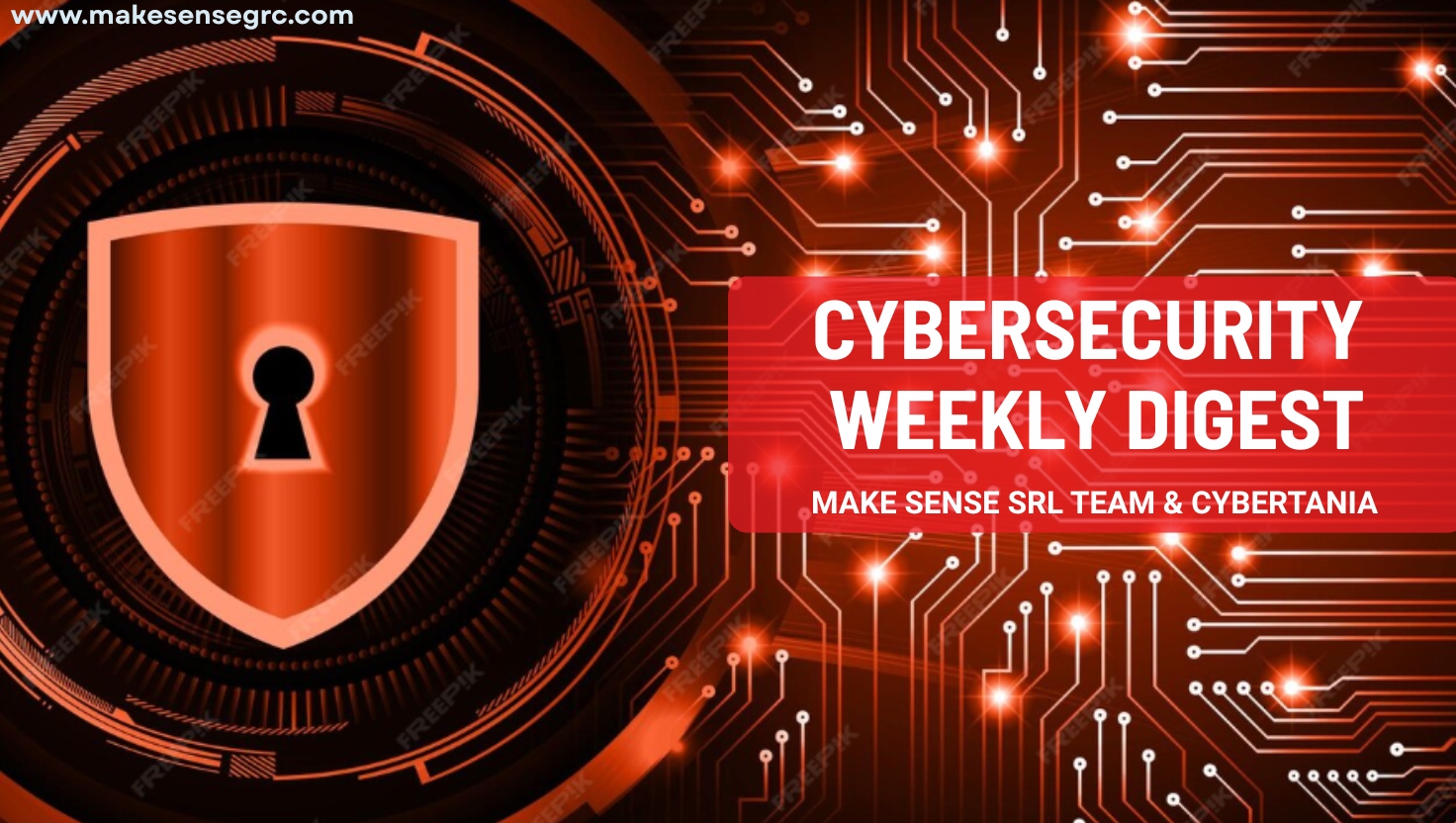
Weekly Cybersecurity Digest [November, Week 2]
Posted on November 11, 2025
Dear Valued Clients,
Welcome to this week’s cybersecurity digest from Make Sense, your trusted partner in strengthening measurable resilience across Europe’s digital, institutional, and regulatory landscape. The second week of November spotlighted the intersection of policy softening, public-sector exposure, and cross-sector resilience building – from GDPR reform debates to hybrid DDoS attacks and cooperation on digital safety and fraud.
The message remains clear: Europe’s cyber maturity now hinges on a balance among innovation, integrity, and consistent enforcement.
✅ Top Stories of the Week
i. Critics call proposed changes to Europe’s GDPR “death by a thousand cuts”
On 10 November 2025, Reuters reported that privacy advocates warned a proposed European Commission package – the “Digital Omnibus” amendments to the General Data Protection Regulation would weaken key safeguards. The package would ease Big Tech’s use of European personal data for AI training and loosen special-category data rules, raising concerns about regulatory backsliding. [Read more via Reuters]
ii. ENISA report shows surge in DDoS and data breaches across EU public administrations
On 10 November 2025, the European Union Agency for Cybersecurity published a sectoral threat landscape, revealing that public administrations across the EU were predominantly targeted by DDoS attacks (69% of incidents) and data breaches. Ministries, parliaments, and national agencies were the primary victims, highlighting the fragility of public-sector cyber resilience amid rising hybrid campaigns. [Read more via Industrial Cyber]
iii. Europol and UEFA sign MoU to tackle match-fixing, fraud and cyber threats in football
On 5 November, Europol and UEFA renewed a Memorandum of Understanding to strengthen cooperation against match-fixing, betting fraud and cyber threats affecting European football. The deal boosts information sharing, joint investigations, and the rapid takedown of illicit betting and fraud infrastructure – highlighting cross-sector cybercrime impacts on culture, commerce, and national security. [Read more via Europol]
Action prompt: Identify one operational area in your organisation where data integrity directly underpins financial or reputational trust – then validate its breach detection mechanisms this quarter.
✅ Industry Trends & Insights
Europe runs the first multi-satellite cybersecurity CTF
Europe completed its first live multi-satellite Capture-the-Flag (CTF) cybersecurity challenge on 7 November, testing real spacecraft and in-orbit telemetry hardening. The event, held in the Netherlands, brought industry, researchers and operators together to probe the resilience of satellite command and telemetry, signalling a growing industry focus on space-asset cybersecurity as satellites become critical national infrastructure. [Read via SatelliteToday]
North European Cyber Days highlight surge in EU cyber-SME funding
At North European Cyber Days (Oslo, 4–6 Nov), investors and ECSO delegates reported a significant increase in venture interest in European cyber SMEs, especially in identity, cloud workload protection, and sovereign cloud solutions. Panels emphasised scaling commercialisation, public-private collaboration and the need for faster go-to-market support to retain European cyber talent and tech. [Read more via B2Match]
Consider: Which of your smaller vendors or innovation partners could be eligible for regional cyber-SME funding or resilience grant programmes in 2026?
✅ Regulatory & Policy Updates
European Commission launches code of practice on marking AI content
On 5 November, the European Commission launched work on a Code of Practice for marking and labelling AI-generated content under the AI Act. The seven-month stakeholder process will produce voluntary machine-readable transparency measures for deepfakes, synthetic audio, video and text, intended to reduce misinformation, fraud and impersonation risks across EU information ecosystems. [Read more via European Commission]
Reflect: Does your communication or marketing function use any generative AI tools – and if so, how would you mark AI-generated media under this emerging framework?
EU, UK and Australia agree to advance child-safety online cooperation
On 7 November, the European Commission, Australia’s eSafety Commissioner and the UK’s Ofcom pledged stronger cooperation on child safety online, including joint work on age verification, research and platform safeguards. The joint communication underlines harmonised cross-jurisdictional regulatory approaches and operational coordination to tackle harmful content and protect minors on major online platforms. [Read more via European Commission]
✅ Cyber IQ Challenge + Proactive Security Hacks
Quick Quiz:
Which initiative best strengthens Europe’s digital resilience amid regulatory reform and the escalation of hybrid threats?
A) Incremental compliance reviews only
B) Coordinated public–private cyber exercises and AI transparency controls
C) Reactive data protection enforcement
D) Isolated national threat-reporting mandates
(Answer below)
Smart Security Moves of the Week:
- Regulatory readiness: Start mapping your data and AI processes against potential Digital Omnibus and AI Act compliance impacts.
- Public-sector resilience: Simulate a multi-vector DDoS incident; test communication continuity with third-party and public-sector partners.
- Cross-sector integrity: Validate fraud monitoring systems against synthetic data or manipulated transaction risks.
- AI transparency pilots: Begin marking or labelling AI-generated visuals and text for internal awareness or training contexts.
Answer: B) Coordinated public–private cyber exercises and AI transparency controls.
✅ Conclusion
From GDPR reform debates and DDoS attacks targeting EU institutions to cross-sector collaborations against fraud and misinformation, this week reaffirmed that Europe’s resilience is being rebuilt through shared vigilance, adaptive compliance, and proactive coordination.
Final reflection: If AI-generated misinformation or a DDoS campaign targeted your organisation tomorrow, how swiftly could you detect, validate, and coordinate a response across technical and communications teams?
At Make Sense, we convert intelligence into measurable defence – building systems that blend regulatory readiness, cyber awareness, and operational resilience across every network and partnership.
Stay secure,
The Make Sense SRL Team & CyberTania

